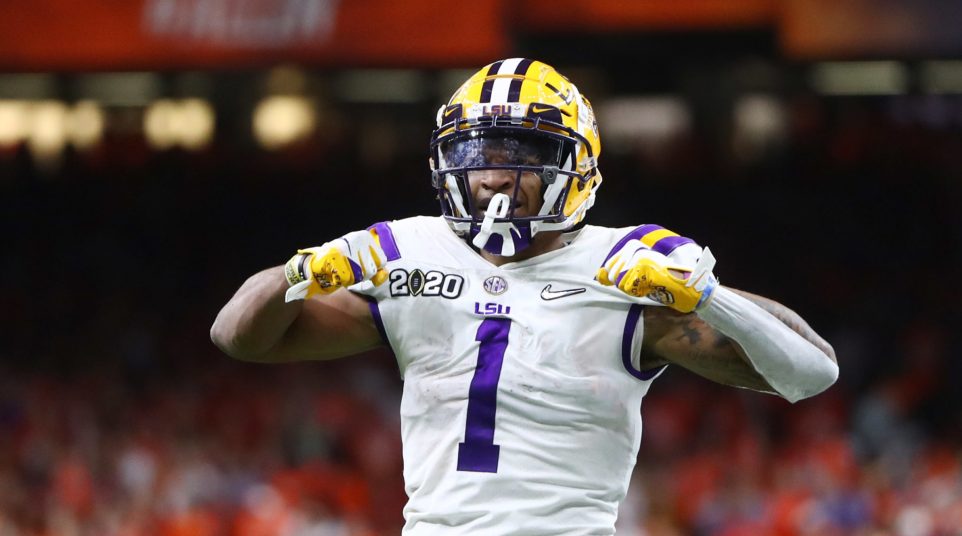
Ja'Marr Chase's decision makes sense even if the timing doesn't
The timing of Ja’Marr Chase’s decision to end his LSU career doesn’t make much sense.
On the other hand, his previous decision to play his junior season in 2020 didn’t make a whole lot of sense, either.
The reigning Biletnikoff Award winner who is also the top-rated wide receiver in the 2021 NFL Draft informed his teammates Sunday that he will not play this season. He will focus instead on preparing for the draft.
If Chase had come out a few weeks back and announced what he told his teammates Sunday, it would not have been surprising.
He is coming off a season in which he led the FBS with 1,780 receiving yards and an SEC-record 20 touchdown receptions as the primary recipient of passes from runaway Heisman Trophy winner Joe Burrow.
Chase caught 9 passes for 221 yards and 2 touchdowns in the Tigers’ National Championship Game victory against Clemson.
His teammates chose Chase to wear No. 7 this season, an honor annually bestowed on the player expected to be the most dynamic Tiger in the upcoming season. (Chase wore No. 1 last season.)
Realistically speaking, Chase’s NFL stock had nowhere to go but down during the 2020 season.
Burrow is gone to the Cincinnati Bengals as the top overall pick in the past NFL Draft. Also gone are major playmakers who attracted significant attention from opposing defenses last season – wide receiver Justin Jefferson, running back Clyde Edwards-Helaire and tight end Thaddeus Moss. Virtually the entire starting offensive line from the championship team also is gone.
Myles Brennan is going to succeed Burrow as the starting quarterback, but it would be unrealistic to think he will succeed the way that Burrow did last season. Brennan might do a fine job and pass for lots of yards and touchdowns, but the productivity is bound to slip.
LSU has talented players ready to take on significant roles to try and mitigate the losses – wide receivers Terrace Marshall Jr. Racey McMath and freshmen Kayshon Boutte and Koy Moore, running backs Chris Curry, Tyrion Davis-Price and John Emery Jr. as well as freshman tight end Arik Gilbert.
But opposing defenses’ No. 1 priority this season was going to be to contain Chase. Double teams were going to be more common than they were last season and Chase’s productivity was inevitably going to drop even if he did everything in his power to become a better NFL prospect this season.
And any kind of serious injury could have dropped Chase from his lofty draft status and cost him millions of dollars.
So it wouldn’t have been surprising if at some point this summer Chase had decided the risks of playing in 2020 outweighed the potential rewards.
But he said he was going to play anyway. Never mind about COVID-19, never mind about the disruptions to this season, never mind about the uncertainty of a season happening at all.
Chase and his father, Jimmy, were adamant all along that the receiver would not do what he has now done.
The elder Chase said earlier this month that his son “loves LSU” and “wants to finish his career out in a positive manner.” He added that his son was “locked in with his team as long as everybody is healthy.”
Two of Chase’s projected teammates opted out recently as defensive end Neil Farrell Jr. chose to sit out because of COVID-19 and play his senior season in 2021. Defensive back Kary Vincent Jr. bypassed his senior season in order to focus on the draft even though he had greater potential for increasing his stock by playing in 2020 than Chase did.
Just last week the Tigers were down to 4 available offensive linemen because everyone else was in quarantine because they had tested positive for COVID-19 or were determined to be at high risk to exposure, according to the Advocate.
The timing of Chase’s announcement – 14 days after LSU started preseason practice and 27 days before the season-opener against Mississippi State in Tiger Stadium – was strange.
Perhaps it was a combination of factors – an evolving sense of what he had to lose by playing, his eyes being opened by the decisions of two teammates and the recent impact of COVID-19 on the roster – that led Chase to change his mind.
But regardless of precisely what triggered the change or the unfortunate timing of it for his former teammates, it’s hard to argue with the logic of Chase’s decision.
